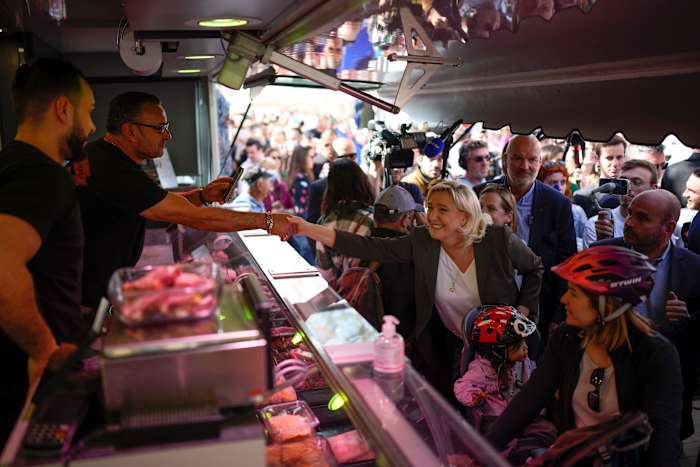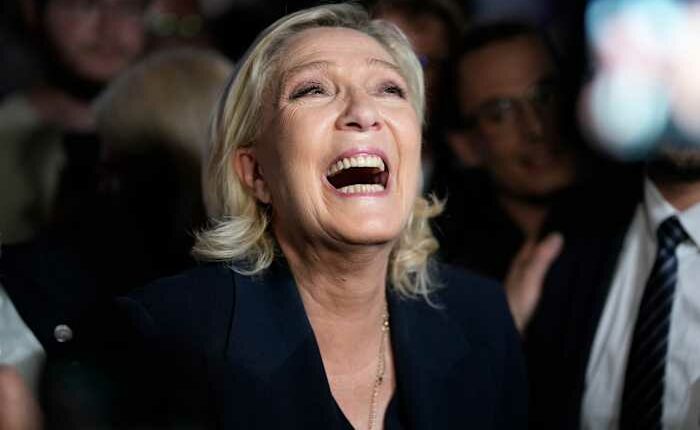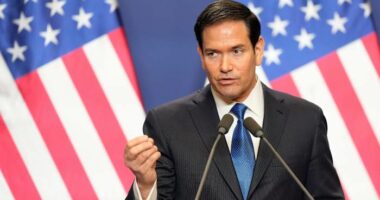Share this @internewscast.com

PARIS – On May 7, 2017, Emmanuel Macron addressed an enthusiastic crowd, celebrating his victory as France’s new president. However, as his presidency draws to a close with just 18 months remaining, the pledge he made that evening seems increasingly elusive.
Macron’s opponent, Marine Le Pen, garnered 10,638,475 votes in that election. While these votes were insufficient to secure a victory for Le Pen, they represented a significant milestone for her and her far-right National Front party, a legacy from her father known for his controversial Holocaust views. This marked a notable turning point for a party once shunned in French politics.
Under the glow of countless French flags, Macron recognized the “anger” and “distress” that fueled support for Le Pen. He vowed to address these concerns, aiming to sway these voters away from extremist choices in the future.
Yet, despite his intentions, Le Pen’s appeal has only grown. Her approach, characterized by a nativist stance against immigration, Muslims, and the European Union, has attracted a broader base. In 2018, she rebranded her party as the National Rally, distancing it from her father’s controversial legacy. Today, it stands as the largest party in the French parliament, positioning her closer than ever to potential leadership with the 2027 elections on the horizon.
Macron’s tenure has also been marked by increasing poverty, a factor contributing to Le Pen’s rising influence.
Several elements account for Le Pen’s growing popularity. Notably, her personal image plays a significant role. At 57, the mother of three, known for her love of cats, presents a more refined and approachable persona compared to her father, a former paratrooper with a history of convictions for inciting racial hatred and minimizing Nazi war crimes. Her father’s passing in January further marks a new chapter for her political journey.
Others are external and include voter disgruntlement over wealth inequality that has worsened significantly under Macron.
An additional 1.2 million people have fallen below the poverty threshold in the world’s seventh-largest economy since the 2017 election and 2022 reelection of France’s pro-business president.
The former investment banker slashed business taxes and watered down a wealth tax to boost France’s allure for investment. Left-wing critics labeled Macron “president of the rich.”
The poverty rate was 13.8% when Macron took power and had barely shifted during the previous presidency of François Hollande, a Socialist.
By 2023, into Macron’s second term and the most recent year with official data from the French national statistics agency, the poverty rate had ballooned to 15.4%, which is its highest level in nearly 30 years of measurements.
The following year, National Rally triumphed in French voting for the European Parliament. So heavy was the defeat for his centrist camp that Macron stunned France by then dissolving the National Assembly.
Again, National Rally surged in the ensuing legislative election. It didn’t come close to winning a majority — no party did. But with 123 of the 577 lawmakers, National Rally vaulted past all other parties and surpassed its previous best of 89 legislators elected in 2022.
Put bluntly: the worse off France becomes, the better National Rally seems to fare.
Showing the correlation
Mapping by The Associated Press both of poverty in France and of the Le Pen vote in the four French legislative elections since she took over her father’s party in 2011 show how both have grown.
The maps show particularly evident progress by National Rally in some of France’s poorest regions, especially in what have become National Rally strongholds: the deindustrialized northeast of France and along its Mediterranean coast.
Region-by-region poverty rates were mapped through 2021, beyond which the national statistics agency INSEE doesn’t have data for all 96 of mainland France’s regions. The AP mapped support for the National Front and then National Rally by using the party’s showing in the first rounds of voting in legislative elections in 2012, 2017, 2022 and 2024.
“We clearly see that the National Rally vote is very strongly correlated with issues of poverty, of difficulties with social mobility” and with voters “who are most pessimistic about the future of their children or their personal situation,” said Luc Rouban, a senior researcher at Paris’ elite Sciences Po school of political sciences who studies the party.
François Ouzilleau, who stood for Macron’s party in the 2022 legislative election and lost to a National Rally winner in his district in Normandy west of Paris, puts it more simply.
“It feeds off anger and people’s problems,” he said.
Parallels with Trump are apparent
But poverty is only part of the Le Pen success story and her appeal isn’t limited to voters who struggle to make ends meet. Combating immigration, the party’s bread and butter since its foundation, remains a central plank of Le Pen-ism.
Rouban sees National Rally similarities with the playbook of U.S. President Donald Trump.
“They’re doing Trump-ism à la française,” he said. “They say, ‘We’re wary of the justice system,’ like Trump. ‘We’re taking back control of our national borders,’ like Trump.”
National Rally establishes strongholds
The party says that its proposals to slash France’s spending on migrants and on the EU and to redirect money to people’s pockets by reducing the costs of energy and other necessities appeal to voters in financial need.
“The French have clearly understood that the ones defending the purchasing power of the working and middle classes are the National Rally,” Laure Lavalette, a parliamentary spokesperson for the party, told the AP.
Lavalette represents the southern Var region, one of National Rally’s new strongholds as Macron’s popularity has plummeted.
In legislative elections that followed his election in 2017, Le Pen’s party failed to win any seats in Var. But after Macron’s reelection in 2022, National Rally grabbed seven of Var’s eight seats and repeated that feat in 2024.
Poverty rates in the Var have long surpassed the national average, the AP’s mapping shows.
Lavalette says that making ends meet is “crazy difficult” for some of her constituents and that “some tell me that they have to chose between eating or heating.”
Voters hunger for change
The 2024 legislative election produced a fractured parliament with fragile minority governments collapsing one after the other. To untangle that knot, Macron could have dissolved the National Assembly again this year, triggering a new election.
That is what National Rally wanted, buoyed by polls suggesting it could perhaps win enough seats to form its first government.
Mindful that such an outcome could saddle him with a National Rally prime minister for the remainder of his presidency, Macron held his fire.
And for now at least, enough lawmakers have rallied around Macron’s prime minister, Sébastien Lecornu, to keep him afloat, mindful of the risk of losing their seats if Macron called voters back to the ballot boxes.
“There’s a sword of Damocles hanging over us, it’s called the National Rally,” said Ouzilleau, who serves as mayor in the Normandy town of Vernon and is a long-time friend of Lecornu.
He says voters have increasingly been telling him that they are ready to test-drive National Rally, breaking decades of uninterrupted rule by mainstream parties.
“It’s been two or three years that we’ve been hearing this: ‘We’ve tried everything except the National Rally, so what is the risk?’” he said.
___
William Jarrett reported from London.
Copyright 2025 The Associated Press. All rights reserved. This material may not be published, broadcast, rewritten or redistributed without permission.










